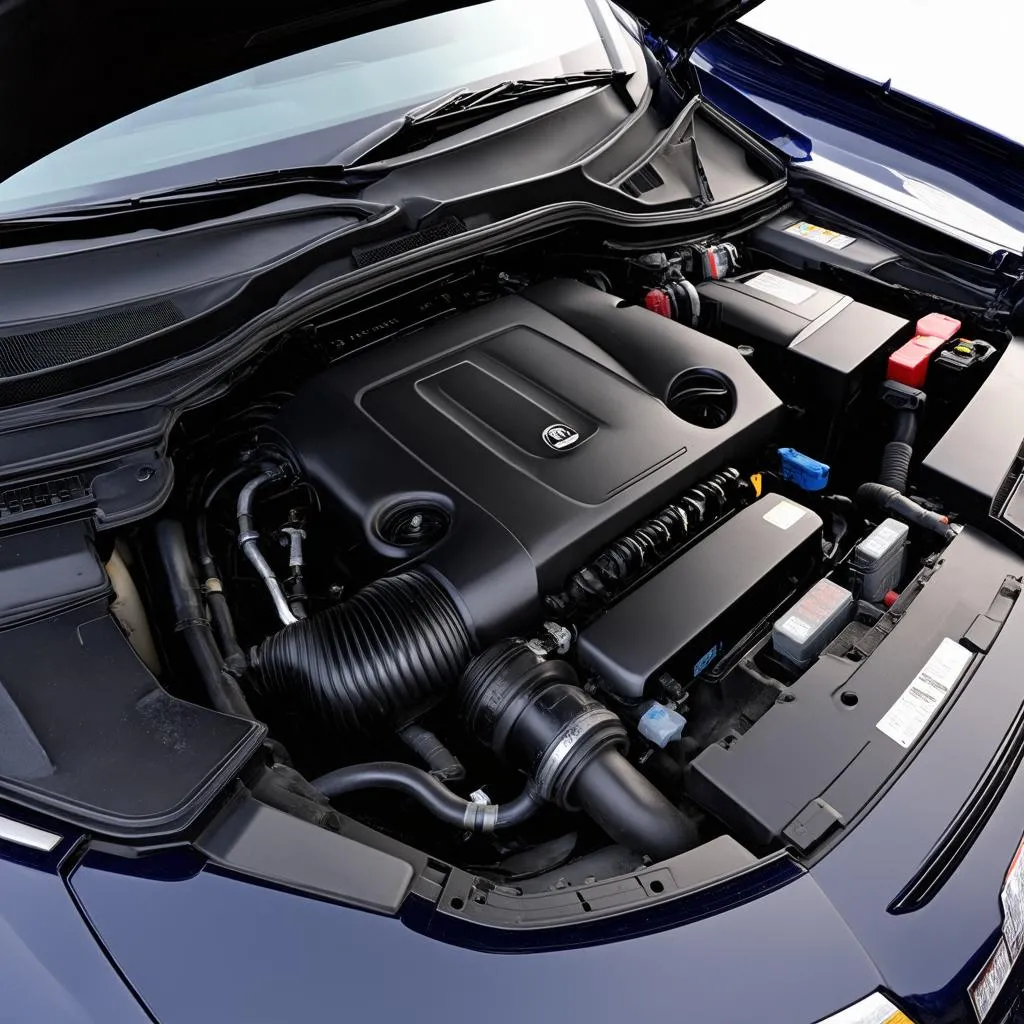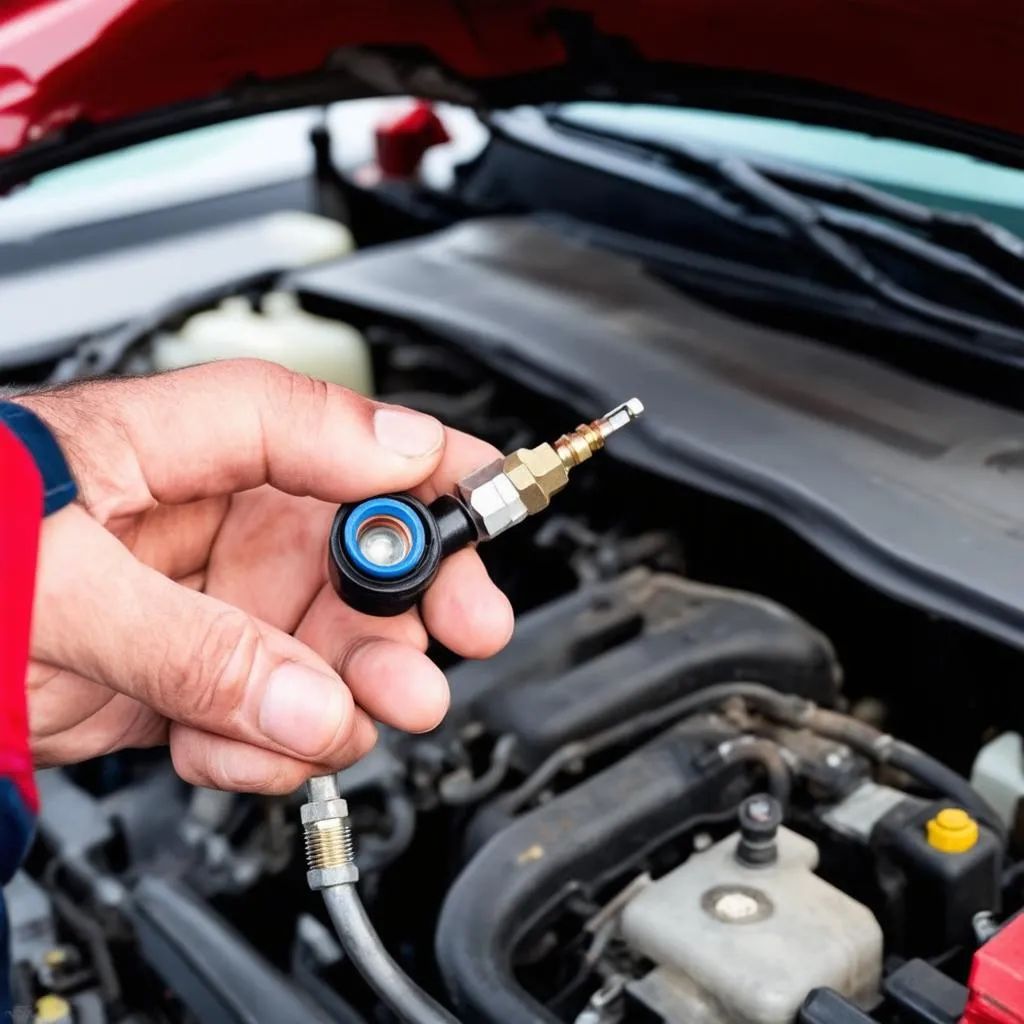“My check engine light is on again,” you mutter under your breath, tapping the steering wheel in frustration. “What is it this time?” The cryptic orange glow on your dashboard can be a source of anxiety, especially when it comes to our beloved GM vehicles. But before you envision hefty repair bills, let’s decipher the code throwing a wrench into your car’s system. Today, we’re diving deep into the world of Gm Obd Code P0174.
Unmasking the Culprit: What is Gm Obd Code P0174?
Imagine your car engine as a hungry beast, always craving the perfect fuel-air mixture to roar to life. Now, imagine someone messing with its food – that’s precisely what P0174 is telling you. This code signals that your engine is experiencing a lean condition in Bank 1.
In simpler terms, the air-fuel ratio in one of your engine’s cylinder banks (most likely cylinders 1-4) is off-kilter, with too much air and not enough fuel. It’s like trying to bake a cake with too much flour and not enough sugar – the result is far from ideal.
Why Should I Care About a Lean Condition?
A lean condition might not sound alarming, but it can lead to some serious engine hiccups down the road:
- Reduced Engine Performance: Remember that hungry beast analogy? A lean mixture means less power and sluggish acceleration.
- Increased Emissions: A poorly burning engine releases harmful pollutants into the atmosphere.
- Engine Damage: In extreme cases, a prolonged lean condition can lead to overheating, detonation (engine knocking), and even catastrophic engine failure.
What Causes a P0174 Code?
Pinpointing the exact culprit behind a P0174 code can be like detective work, but here are the usual suspects:
- Vacuum Leaks: Think of vacuum leaks as tiny gremlins sneaking extra air into your engine, disrupting the delicate air-fuel balance.
- Faulty Oxygen Sensor (O2 Sensor): The O2 sensor acts like your engine’s taste tester, monitoring the oxygen content in the exhaust gases to ensure the right fuel-air mix. A faulty sensor can send inaccurate readings, leading to a lean condition.
- Dirty or Clogged Fuel Injectors: Just like a clogged artery, dirty fuel injectors can restrict fuel flow, starving your engine of the fuel it needs.
- Fuel Pressure Problems: Low fuel pressure, often caused by a failing fuel pump or a clogged fuel filter, can also trigger a P0174 code.
- Mass Air Flow (MAF) Sensor Issues: The MAF sensor measures the amount of air entering the engine. A malfunctioning MAF sensor can mislead the engine control unit (ECU) into delivering the wrong amount of fuel.
Taming the Engine Beast: Resolving P0174
Don’t panic if your GM throws a P0174 code your way. Here’s a step-by-step approach to address the issue:
- Verify the Code: Before you start replacing parts, double-check the code with a reliable OBD-II scanner to ensure it’s not a false alarm.
- Inspect for Vacuum Leaks: A thorough visual inspection of vacuum hoses and intake manifold gaskets can often reveal telltale cracks or loose connections.
- Check the Oxygen Sensor: Inspect the O2 sensor for damage or contamination and test its functionality. Replacement might be necessary if it’s not reading correctly.
- Clean or Replace Fuel Injectors: Consider having your fuel injectors professionally cleaned or replaced if they’re clogged or malfunctioning.
- Inspect the Fuel System: Check fuel pressure and ensure the fuel filter isn’t clogged. Replace the fuel pump if it’s failing to deliver adequate pressure.
- Test the MAF Sensor: Use a multimeter to test the MAF sensor’s voltage output and compare it to manufacturer specifications. Clean or replace the sensor if necessary.
 Engine Bay
Engine Bay
Remember: While some of these tasks can be tackled by DIY enthusiasts, it’s always best to consult a qualified mechanic, especially for complex repairs involving the fuel system or engine sensors.
Don’t Let P0174 Spoil Your Ride
Just like a well-tuned orchestra, your car’s engine relies on the harmonious interplay of various components. Ignoring a P0174 code is like letting a discordant note linger, eventually disrupting the entire symphony. By understanding the causes and taking prompt action, you can ensure your GM vehicle continues to hum along smoothly for miles to come.
FAQs about Gm Obd Code P0174
Q: Can I still drive my car with a P0174 code?
A: While you might be able to drive short distances, it’s not advisable. Driving with a lean condition can lead to further engine damage and reduced fuel efficiency.
Q: How much does it cost to fix a P0174 code?
A: The repair cost varies depending on the underlying cause. A simple vacuum leak fix might cost under $100, while replacing a fuel pump could set you back several hundred dollars.
Q: Can a bad gas cap cause a P0174 code?
A: While a loose or damaged gas cap can trigger other emissions-related codes, it’s unlikely to cause a P0174 code directly.
Q: Can I use a code reader to clear the P0174 code?
A: Yes, you can use an OBD-II scanner to clear the code. However, the check engine light will reappear if the underlying problem hasn’t been addressed.
Explore More Automotive Insights
- Deciphering 1991 GMC Sierra OBD Codes with Keyswitch
- Troubleshooting Common 1993 Buick LeSabre Problems and OBD Codes
 Oxygen Sensor
Oxygen Sensor
Need Help Diagnosing and Fixing Your Car Troubles?
Our team of expert automotive technicians is just a message away! Contact us on WhatsApp at +84767531508 for 24/7 support with diagnostic tools and car repair guidance. Let us help you get back on the road with confidence!